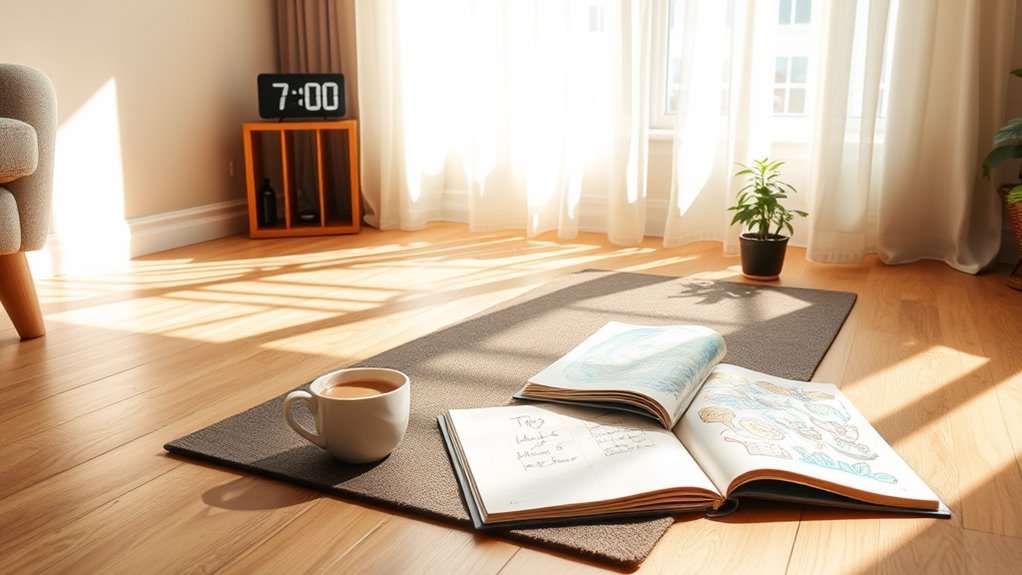This One Trick Helped Me Sleep Through the Night (Every Night)
Establishing a consistent sleep routine is the trick that can help you sleep through the night every night. By going to bed and waking up at the same time daily, including weekends, you’ll reinforce your body’s natural sleep-wake cycle. Pair this with a calming pre-sleep ritual, like deep breathing or gentle stretching, and you’ll set the stage for restful sleep. Plus, creating a cool, dark, and quiet environment enhances your experience further—there’s more to discover about perfecting your sleep.
Key Takeaways
- Establishing a calming bedtime routine signals your body to wind down, enhancing your ability to sleep through the night.
- Limiting screen time an hour before bed reduces distractions and helps maintain your natural sleep cycle.
- Maintaining a cool, dark, and quiet sleep environment supports restful slumber and minimizes disturbances during the night.
- Practicing deep breathing or progressive muscle relaxation before bed calms the mind and prepares the body for sleep.
- Keeping a consistent sleep schedule by waking up and sleeping at the same time daily promotes better overall sleep quality.
The Importance of Sleep for Overall Health
Sleep is your body’s natural reset button, playing an essential role in your overall health. It’s during these restorative hours that your mind and body rejuvenate, ensuring you function at peak performance.
With better sleep, you enhance cognitive abilities, improve your mood, and strengthen your immune system. Consistent, quality sleep doesn’t just combat fatigue; it also lowers the risk of chronic illnesses, boosts metabolism, and promotes emotional stability.
You mightn’t realize it, but the foundation of your liveliness hinges on adequate rest. By prioritizing sleep, you equip your body to handle daily stresses more effectively and maintain a balanced lifestyle. Moreover, the essential role of sleep emphasizes its significance for mental well-being and long-term health outcomes.
My Struggle With Sleepless Nights
You know those nights when you toss and turn, unable to find a comfortable position?
After countless hours of restlessness, you start searching for solutions to finally achieve peaceful sleep.
It’s a struggle many face, but there’s hope in discovering what works for you.
Incorporating simple techniques, like establishing a sleep routine, can significantly improve your sleep quality.
Nights Full of Restlessness
Even when the world outside grows quiet, your mind races with a flurry of thoughts, making rest seem elusive.
You toss and turn, battling various distractions that keep sleep at bay. It’s exhausting, and you’re not alone.
Here are three common culprits behind your sleepless nights:
-
Worries: Financial concerns or work deadlines circle relentlessly, preventing you from calming your mind.
-
Stimulating Screens: Late-night scrolling on your phone disrupts your brain’s natural wind-down process.
-
Caffeine: That afternoon coffee might be your favorite, but it lingers in your system, sabotaging your sleep cycle.
With these challenges looming, it’s no wonder you find peace so hard to grasp, waiting for that elusive night of restful slumber.
Seeking Peaceful Sleep Solutions
As restless nights accumulate, finding effective strategies for peaceful sleep feels increasingly essential. You might’ve tried countless remedies, from counting sheep to sipping herbal teas, but mastery over your sleep requires a more intentional approach.
Start by creating a calming bedtime routine that signals to your mind and body it’s time to wind down. Incorporate calming rituals like deep breathing or gentle stretching.
Consider your sleep environment—keep your bedroom cool, dark, and quiet to promote restful slumber. Limit screen time before bed; the blue light disrupts your sleep cycle.
Finally, acknowledge your thoughts without judgment, letting them drift away. By refining these strategies, you’ll reclaim your nights, embracing the rejuvenating, restorative sleep you deserve.
The Research Behind Sleep Patterns
While understanding sleep patterns may seem complex, research reveals that they follow a natural rhythm influenced by various factors, including age, lifestyle, and overall health. Knowing more about these influences can empower you to optimize your sleep.
-
Age: Sleep needs and cycles change over time, with older adults often experiencing lighter sleep.
-
Lifestyle: Your daily habits—exercise, screen time, and substance use—can greatly impact sleep quality.
-
Health Conditions: Factors like stress, anxiety, and certain medical conditions can disrupt normal sleep patterns. Additionally, implementing a simple nightly change can significantly enhance sleep quality and help you sleep through the night.
Discovering the One Trick: Establishing a Routine
Establishing a sleep routine can dramatically improve your chances of sleeping through the night.
To master your slumber, begin by setting a consistent bedtime and wake-up time, even on weekends. This reinforces your body’s internal clock, making it easier to fall asleep and wake up refreshed.
Incorporate calming activities before bed, like reading or meditating, to signal your brain that it’s time to wind down. Avoid screens and stimulating substances in the evening; both can sabotage your efforts.
Pay attention to the duration of your sleep, aiming for 7-9 hours nightly. Consistency is key—stick to your routine to reap the benefits. According to experts, essential pre-bedtime routines that promote relaxation can significantly enhance your sleep quality.
With time and commitment, you’ll find yourself sleeping soundly and waking energized.
Creating the Perfect Sleep Environment
To enjoy a restful night’s sleep, creating the perfect sleep environment is essential. A conducive atmosphere can considerably enhance your sleep quality.
Here are three key elements to focus on:
-
Temperature Control: Keep your bedroom cool, ideally between 60-67°F (15-19°C). This range promotes ideal sleep conditions.
-
Lighting: Use blackout curtains to eliminate outside light. Dim the lights an hour before bed to signal to your body that it’s time to wind down.
-
Noise Management: Minimize disruptive sounds with earplugs or a white noise machine. Consistent, soothing sounds can help mask any disturbances. Additionally, be aware that disruptive sounds can significantly hinder your ability to achieve better sleep.
The Role of Diet and Exercise in Sleep Quality
Your diet and exercise habits play an essential role in how well you sleep at night.
What you eat can affect your body’s ability to wind down, while the timing of your workouts can either help or hinder your rest.
Understanding this connection can help you make better choices for a good night’s sleep.
Impact of Nutrition
While many factors contribute to sleep quality, nutrition and exercise play essential roles that can’t be overlooked. Your dietary choices can greatly influence how well you sleep.
Here are three key aspects to take into account:
-
Hydration: Dehydration can disrupt your sleep cycle. Aim for adequate water intake throughout the day.
-
Nutrients: Incorporate sleep-promoting foods rich in magnesium and omega-3 fatty acids, like nuts, seeds, and fatty fish. They help regulate sleep hormones.
-
Timing: Avoid large meals close to bedtime. Instead, opt for light snacks that won’t burden your digestive system.
Exercise Timing and Sleep
When you exercise can greatly influence your sleep quality. Timing your workouts can make a significant difference in how well you rest at night. For instance, morning or early afternoon exercise boosts alertness, while evening workouts might interfere with your ability to wind down.
| Time of Day | Impact on Sleep |
|---|---|
| Morning | Enhances energy & mood |
| Afternoon | Improves overall wellness |
| Evening | May disrupt sleep onset |
Mindfulness and Relaxation Techniques
To achieve a restful night, incorporating mindfulness and relaxation techniques into your evening routine can make a significant difference.
These practices help calm your mind and prepare your body for sleep. Here are three effective techniques:
-
Deep Breathing: Focus on your breath, inhaling deeply through your nose and exhaling slowly through your mouth. Repeat this for several minutes.
-
Progressive Muscle Relaxation: Tense each muscle group for a few seconds and then relax. Start from your toes and work up to your head.
-
Guided Imagery: Visualize a peaceful scene, such as a beach or forest. Engage your senses by imagining the sound, smell, and feel of that place.
Incorporating these techniques can transform your nights into restful experiences.
Tracking Progress: How I Measured Improvement
As you implement mindfulness and relaxation techniques, it’s essential to track your progress to see how these changes affect your sleep quality.
Start by keeping a sleep journal, recording the time you go to bed, wake up, and how rested you feel each morning.
Utilize sleep tracking apps or wearable devices to gather quantitative data on your sleep cycles and duration.
Make note of any patterns you observe, like which techniques yield the best results.
Each week, review your entries to identify what works and what needs adjustment.
This focused approach not only fosters mindfulness but also empowers you to refine your practices, ensuring you master the art of sleep.
Your consistent evaluation will lead to continuous improvement.
Tips for Maintaining Consistent Sleep Habits
Establishing a consistent sleep schedule can considerably enhance your ability to fall and stay asleep.
Mastering your sleep habits hinges on a few essential practices. Here are three tips to help you maintain consistency:
-
Wake Up and Sleep at the Same Time: Choose a wake-up and bedtime that works for you and stick to it, even on weekends.
-
Create a Pre-Sleep Routine: Engage in calming activities, like reading or meditating, for at least 30 minutes before bed to signal your body that it’s time to wind down.
-
Limit Light Exposure: Reduce screen time in the evening and guarantee your sleeping environment is dark to promote the release of melatonin.
Frequently Asked Questions
What if My Sleep Issues Are Due to Underlying Medical Conditions?
If your sleep issues stem from underlying medical conditions, you should consult a healthcare professional. They can evaluate your symptoms and recommend appropriate treatments, ensuring your sleep improves effectively and consistently for your overall well-being.
Can My Sleep Routine Change With Different Seasons?
Absolutely, your sleep routine can shift with the seasons. Changes in daylight, temperature, and even your activities can impact your body’s internal clock. Adjusting your habits can optimize your rest throughout the year.
How Long Does It Take to Establish a New Sleep Routine?
Establishing a new sleep routine typically takes about two to four weeks. Consistency is key; stick to your schedule, create a calming pre-sleep environment, and you’ll train your body to adapt more quickly.
Will Caffeine Affect My Sleep Even if Consumed Earlier in the Day?
Yes, caffeine’s effects can linger, disrupting your sleep even if consumed earlier. When you consume it, your body processes it slowly, so it’s best to limit intake to avoid compromising your restful night.
Are There Any Apps That Can Help Track My Sleep Quality?
Yes, several apps can help you track your sleep quality. Look into options like Sleep Cycle, Calm, or Sleep Score, which analyze your patterns and offer insights to improve your nightly rest. You’ll benefit greatly!





